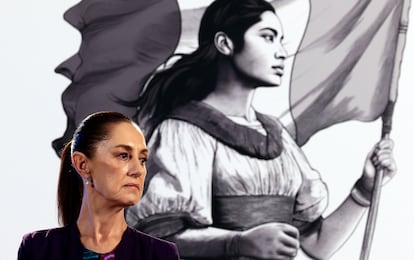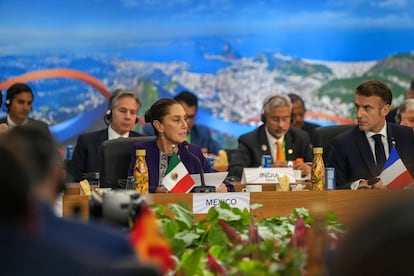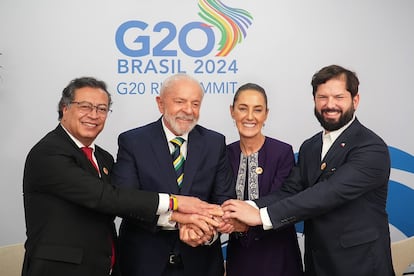From Venezuela to Trump: Sheinbaum returns Mexico to the front line of international politics
The president has the change of power in the White House and the controversy over the reelection of Nicolás Maduro in Venezuela as the main international challenges her administration faces at the start of 2025

The Mexican president arrived at the G20 summit in Rio de Janeiro with a declaration of intent. Claudia Sheinbaum held bilateral meetings with Joe Biden of the United States; Xi Jinping of China; Justin Trudeau of Canada, and Emmanuel Macron of France. She embraced Luiz Inácio Lula da Silva upon her arrival and sat down with Colombian President Gustavo Petro and Chilean leader Gabriel Boric to strengthen her alliance with progressive governments in Latin America. She also found time to talk with members of MIKTA (Mexico, Indonesia, South Korea, Turkey, and Australia) and to present to the main world leaders her proposal to allocate 1% of military spending to reforestation programs to combat climate change. After a six-year absence and despite a few exceptions, the Mexican government returned to the front line of international politics.
Sheinbaum’s first international trip, in mid-November and just over a month after taking office, continues to echo and still divides opinion on whether it represented a significant shift from the line that her predecessor and mentor, Andrés Manuel López Obrador, had marked out in the world. “It was an important change from what was done before: she held meetings at the highest level and brought the country out of the isolation to which it had been subjected during the previous government,” says retired diplomat Ernesto Campos. “She also finds herself in a complex situation, especially in light of Donald Trump’s victory in the United States,” he adds.
The Mexican president, however, maintained several elements that were passed down to her: from the symbolic — the decision to travel on a commercial flight or the references to Benito Juárez in her speech — to the programmatic, by taking advantage of the showcase for policies such as Sembrando Vida (Sowing Life) or insisting on equal treatment with the United States. “Continuity with change” was her campaign slogan, an omnipresent paradox at the beginning of her mandate and which has also been reflected in the first glimpses of her foreign policy. This apparent contradiction has also set her margins of maneuver in the presidential chair, by accepting the role of heir to López Obrador’s political project and, at the same time, sending the message that she will seek to put her own stamp on the movement she now leads.

After the G20 and the international spotlight received by the first woman to hold the presidency of Mexico, the arrival of Trump has captured the attention and efforts of her government abroad. The Republican returns to the White House on January 20 with a battery of threats under his arm, which have called into question the future of critical circuits and the health of the bilateral relationship: threats of a trade war, pressures in the fight against drug trafficking, and heavy-handed measures against migration that have unleashed fears among a Mexican diaspora that exceeds five million people in the U.S. The letters, the exchange of statements on social networks, the calls and the misunderstandings that have arisen, have fueled the forecasts of four years of turbulence and tension, but they have also represented a first contact to measure personal affinities and the possibility of finding negotiated solutions in the midst of recent frictions.
Sheinbaum has not yet decided whether Trump’s inauguration will be her first visit to U.S. territory. She also has to designate who will be her interlocutors with the incoming Republican government in key positions, such as her representative at the Embassy in Washington or the members of her team for the renegotiation of the USMCA free trade agreement. She has already sent signals of restraint against Trump, with the mobilization of her consular network in the face of the threat of mass deportations and the largest seizure of fentanyl in the country’s history. But the majority of analysts still have doubts about the underlying strategy on the multiple open fronts. “Mexico has reacted well by standing firm in the face of threats, but the time has come to negotiate through formal and informal channels,” says Andrew Selee, director of the Migration Policy Institute, who warns that the challenges posed by Trump 2.0 will be greater than those faced by the previous government.
The lights of events such as the G20 contrast with some shadows that predominate in domestic politics. The scandal of a private party held at the National Museum of Art by Martín Borrego, who was in the inner circle of trust of former foreign minister Alicia Bárcena, has taken its toll, as well as the express designation of Rutilio Escandón, former governor of Chiapas, as consul in Miami. “It sends a terrible signal, because he does not correspond to the profile of what is needed at this time in the United States. It is also a serious error because the role of [career] consuls is underestimated,” says Campos. Concerns about the health of public finances have hovered over the Ministry of Foreign Affairs for years, even since the government of Enrique Peña Nieto, and have deepened at a critical moment for the mobilization of the country’s diplomatic resources.
Before Trump, Nicolás Maduro will be sworn in again in Venezuela on January 10, amid criticism from abroad and suspicions of electoral fraud. Colombia has insisted in recent weeks on the need for Mexico to take a tougher position in the face of political crises and to draw on its regional leadership alongside Brazil. The Mexican government, however, has kept its distance under the premise of respecting its foreign policy principles, but also as host of negotiations between Chavismo and the opposition. In an unexpected turn, both governments announced this week that they will send a diplomatic representation to Maduro’s inauguration, thus moving from impartiality and negotiations to support for the Chavista leader.
Campos, who has experience in various embassies in Latin America, predicts that regional politics will be one of the most challenging issues in the coming weeks. In addition to the crisis in Venezuela, there are also legacies such as the stagnation of political contacts with Peru, the break with Ecuador, and the indifference toward regimes such as Daniel Ortega’s Nicaragua. “There is continuity, and that is not necessarily bad,” says the diplomat about the diplomatic alliance with other left-wing governments. “But I do see it as bad that there is no rapprochement with Peru or a negotiated agreement with Ecuador.”

Another point where there has been more continuity than change has been the cooling of the political relationship with Spain, which led to the snub of Felipe VI and the first international controversy of Sheinbaum’s administration, even before she assumed office. The channels in other areas remain open, with nods such as the appointment of the European country as guest of honor at the Guadalajara International Book Fair, and a dynamism that remains in economic ties, but few trust that the situation will be unblocked in the short term, in the midst of the current controversy over the requests for apologies for the abuses committed during the Conquest and the colonial era. The figure of Trump again influences other corners of the world, such as the need to recalibrate the relationship with China and to diversify diplomatic contacts with allies such as the European Union, which has already made progress in deepening its economic integration with the Mercosur countries, but not with Mexico.
The Sheinbaum administration has made other attempts to influence the international arena, by condemning the abuses of the Israeli government in Palestine or having a greater presence in multilateral forums, although without distancing itself from López Obrador’s critical tone toward the UN and other organizations. Despite the road ahead, the president’s first months have already left a series of gestures on how she will stand up to an increasingly challenging and turbulent world context. But challenges that are already imminent can set the tone and priorities for what will come for the rest of the six-year term. It will be, as the official doctrinaire says, a time for definitions.
Sign up for our weekly newsletter to get more English-language news coverage from EL PAÍS USA Edition
Tu suscripción se está usando en otro dispositivo
¿Quieres añadir otro usuario a tu suscripción?
Si continúas leyendo en este dispositivo, no se podrá leer en el otro.
FlechaTu suscripción se está usando en otro dispositivo y solo puedes acceder a EL PAÍS desde un dispositivo a la vez.
Si quieres compartir tu cuenta, cambia tu suscripción a la modalidad Premium, así podrás añadir otro usuario. Cada uno accederá con su propia cuenta de email, lo que os permitirá personalizar vuestra experiencia en EL PAÍS.
¿Tienes una suscripción de empresa? Accede aquí para contratar más cuentas.
En el caso de no saber quién está usando tu cuenta, te recomendamos cambiar tu contraseña aquí.
Si decides continuar compartiendo tu cuenta, este mensaje se mostrará en tu dispositivo y en el de la otra persona que está usando tu cuenta de forma indefinida, afectando a tu experiencia de lectura. Puedes consultar aquí los términos y condiciones de la suscripción digital.









































